Joe Henderson: The Big Dog has his say
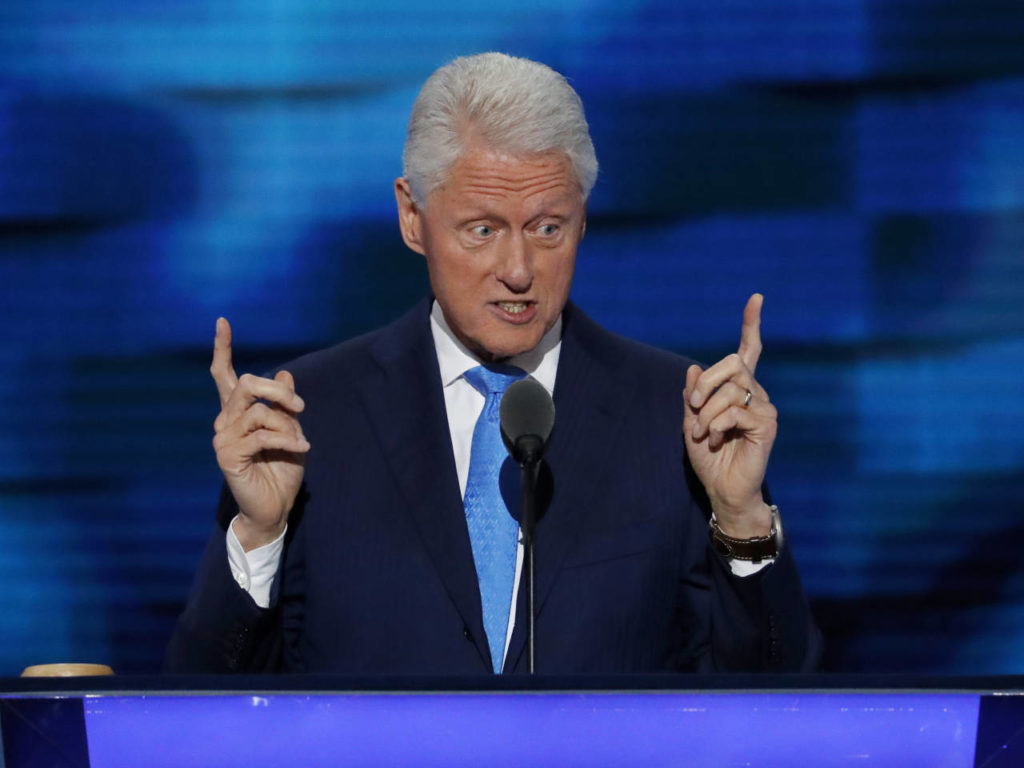
If you weren’t saying it out loud Tuesday night, you had to be at least thinking about Bill Clinton’s multiple marital infidelities as he spun the story of his courtship and undying love for Hillary. I assume this was a calculated risk by Camp Clinton to show Hillary as a woman of strength, smarts and family. But the puppy-dog pursuit by the Big Dog to win her hand in marriage also, like it or not, reminded the world again that he didn’t keep up his end of the “forsaking all others” part of the wedding vows. Some things just stick to a couple’s hide like they’re super-glued. At least a fair part of the Republican hatred (yep, hatred) of Hillary is her failure to punch her wandering hubby in the nose during those dark days. They paint her as a woman of opportunity, refusing to kick her husband to the curb because it would hurt her own political ambition. At least part of that is certainly true, but we aren’t electing a Sunday School teacher to sit in the Oval Office. If that were the case, Jimmy Carter would have gone down in history as one of the great presidents. And lest Republicans forget, their man has a few (thousand) skeletons in his closet as well. That brings us to the second part of Bill Clinton’s as-always lengthy turn at the microphone. If the first part reminded us that his behavior toward his wife was abominable, the second laid out a compelling argument why she is more than prepared to assume the duties of the most powerful office in the world. Let the Big Dog speak! Democrats have generally done a good job this week skirting around the controversies of WikiLeaks, Debbie Wasserman Schultz, and upset Bernie Sanders’ supporters. About 200 of them walked out of the convention Tuesday, when Clinton was formally named the nominee of the Democratic Party. Even the expected move by Sanders to declare her the nominee by acclimation failed to soothe some of his most dedicated backers. But the Bernie or Bust crowd actually blew it. If they wanted to make a ruckus, they should have stayed in the arena and made their protest in front of national TV cameras. As it was, well, who cares? With the story of possible Russian involvement in the WikiLeaks fiasco gaining legs, it’s possible Democrats will have navigated a potentially crushing week and emerge from the convention well-positioned to win. Bill Clinton’s portrait of his wife as a dedicated champion of those overlooked by society was compelling. He painted her as someone with a proven record of tackling the most difficult tasks, paying attention to details (that Trump famously has little use for), and standing strong against what she considers social injustice. President Barack Obama will layer on to that with his Wednesday night address. It should set Hillary up in grand style for her acceptance speech to close the convention Thursday, and then it’s up to her and Democrats going forward to convince America to choose her. So far, both parties have basically run on the platform that you vote for them because the other candidate is terrible. So give Bill Clinton credit for one thing. After a nation had lowered its collective raised eyebrows at the cuddly cute story he tried to spin at first, he laid out a solid case to vote for his wife — and not simply against Donald Trump. ___ Joe Henderson has had a 45-year career in newspapers, including the last nearly 42 years at The Tampa Tribune. He has covered a large variety of things, primarily in sports but also hard news. The two intertwined in the decade-long search to bring Major League Baseball to the area. Henderson was also City Hall reporter for two years and covered all sides of the sales tax issue that ultimately led to the construction of Raymond James Stadium. He served as a full-time sports columnist for about 10 years before moving to the metro news columnist for the last 4 ½ years. Henderson has numerous local, state and national writing awards. He has been married to his wife, Elaine, for nearly 35 years and has two grown sons — Ben and Patrick.
Joe Henderson: DNC day one – Hillary Clinton’s apathy problem
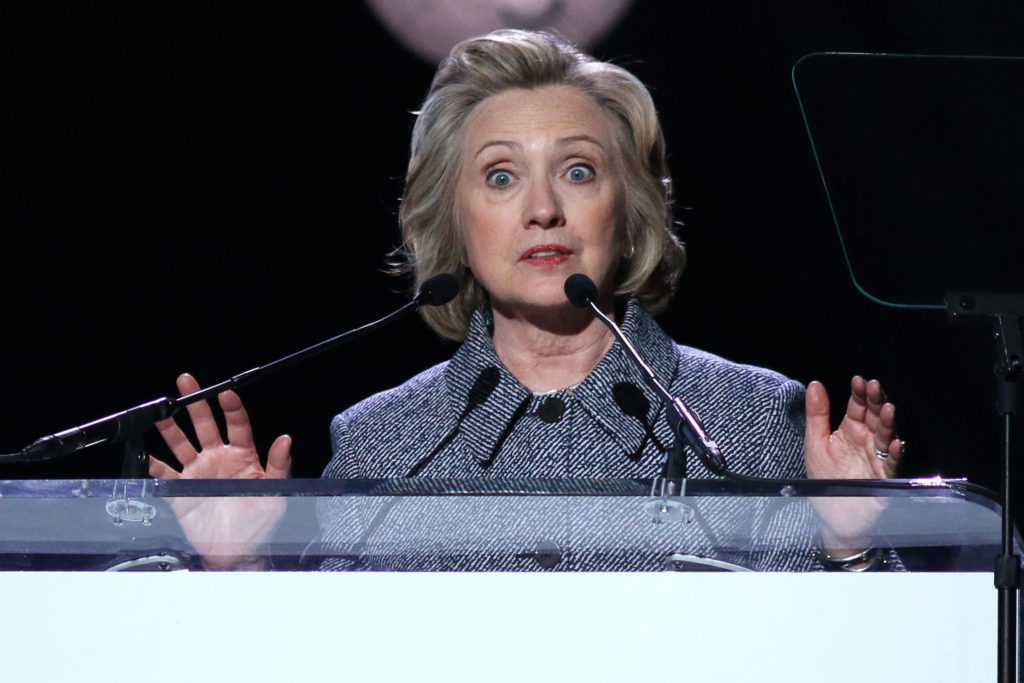
After the first night of the Democratic National Convention, it’s clear that Hillary Clinton’s biggest problem has less to do with emails and big donors and more to do with apathy. That much became apparent after watching Bernie Sanders’ supporters shower their candidate with the kind of full enthusiastic passion that has thus far eluded Clinton. For that matter, the same parallel can be drawn in the Republican Party for the way Donald Trump’s backers are with him no matter what. The lesson Clinton should learn from this, if it’s not already too late, is that both Sanders and Trump reached out to groups often ignored in our national politics. Trump’s campaign will rise or fall on the strength of disaffected white middle-class voters who feel like they pay for everything and receive nothing. For Sanders, it is those thousands of young voters who flocked to him because he cared enough to include them. The bitter lesson for them is that despite all their support, their candidate didn’t win. Yes, comedian and Sanders supporter Sarah Silverman was correct when she scolded the crowd Monday night, “To the Bernie or bust crowd, you’re being ridiculous,” but don’t lose sight of what was really happening. You saw it in the tear-stained faces of Sanders’ supporters when he came out to speak. You heard their cheers when he told them, “We have begun a political revolution to transform America. That revolution, our revolution, continues.” Keyword: “our” revolution. Compare that message of inclusion to Trump’s promise to single-handedly transform America. Republicans have chosen the gunslinger. But many Democrats, in rallying around Sanders, are demanding to be heard. That’s Clinton’s biggest challenge. Sanders gave Clinton the full force of his endorsement. Speaking directly to his backers who have threatened to stay home, he said, “If you think you can sit it out, take a moment to think about the Supreme Court justices Donald Trump would nominate.” What he was actually saying to millions of supporters was this: If you’re disappointed now, just imagine how you’ll feel if Trump is elected. But during the campaign Sanders also expertly painted Clinton as a tool of big money and Wall Street. That’s not an easy image to shake. She can’t win without Sanders’ supporters, but to win them over she has to convince them she has heard their voice. For that, it will take even more work than Sanders simply saying, as he did Monday, “Hillary Clinton must become the next president of the United States.” Sanders’ speech may go down as the most important of the convention. He showed the nation that his support was deep and real, and that his ideas must be taken seriously. He had managed to turn the opening-day narrative away from the WikiLeaks scandal and Debbie Wasserman Schultz. He likely even convinced many of those who supported him to get behind Clinton going forward. Democrats better hope that’s the case. With every poll showing a tight race, especially in the swing states, they need every vote they can get. They may have picked up a few more Monday. Whether they picked up an equal amount of enthusiasm for their candidate, though, is still in question. ___ Joe Henderson has had a 45-year career in newspapers, including the last nearly 42 years at The Tampa Tribune. He has covered a large variety of things, primarily in sports but also hard news. The two intertwined in the decadelong search to bring Major League Baseball to the area. Henderson was also City Hall reporter for two years and covered all sides of the sales tax issue that ultimately led to the construction of Raymond James Stadium. He served as a full-time sports columnist for about 10 years before moving to the metro news columnist for the last 4 ½ years. Henderson has numerous local, state and national writing awards. He has been married to his wife, Elaine, for nearly 35 years and has two grown sons — Ben and Patrick.
Democratic Convention: what to watch for on Day 2
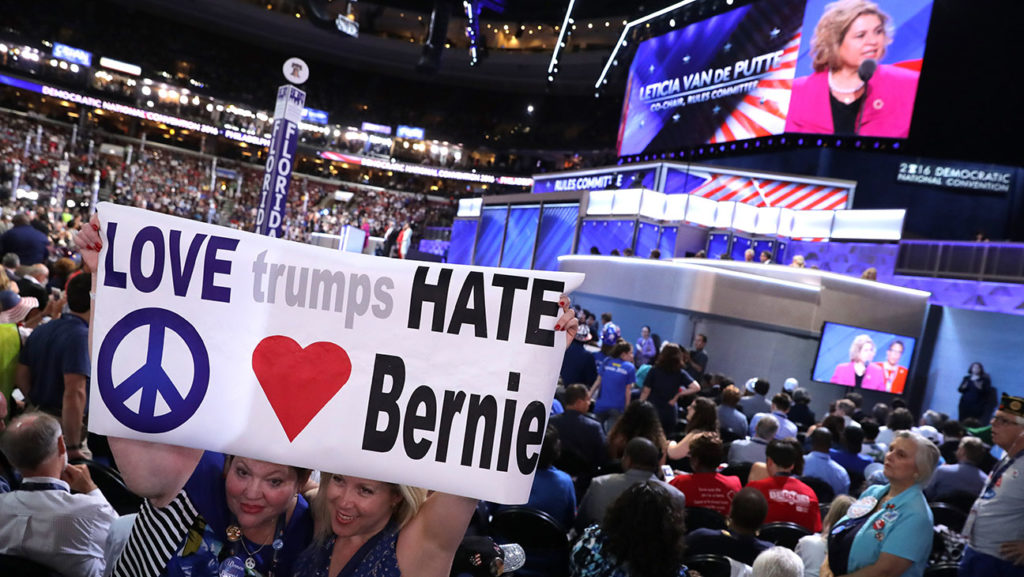
To say Day One of the 2016 Democratic National Convention was eventful, would be an understatement. Filled with drama and chants of “Bernie! Bernie!” interrupting speeches throughout the evening, the Democratic Party endeavored to move past the weekend’s email leak scandal where thousands of emails showing DNC officials were attempting to undercut Vermont Sen. Bernie Sanders during his primary campaign against presumptive nominee Hillary Clinton. Unity was supposed to be the theme of the first day, but it certainly didn’t feel that way Monday night. Tuesday the Party will continue to push forward with a day themed, “A lifetime of fighting for families,” and will highlight how Hillary has spent her career working to make a difference for children, families, and our country. Clinton will also formally become Party’s nominee pending a roll call vote. The list of Tuesday’s speakers: Bill Clinton: Former U.S. President Mothers of the Movement: Gwen Carr, mother of Eric Garner; Sybrina Fulton, mother of Trayvon Martin; Maria Hamilton, mother of Dontré Hamilton; Lucia McBath, mother of Jordan Davis; Lezley McSpadden, mother of Michael Brown; Cleopatra Pendleton-Cowley, mother of Hadiya Pendleton; Geneva Reed-Veal, mother of Sandra Bland. Nancy Pelosi: U.S. Congresswoman from California and House Democratic Leader Donna Brazile: Democratic National Committee vice chair of voter registration and participation Jason Carter: Former Georgia state senator Cecile Richards: President of Planned Parenthood Action Fund Jelani Freeman: Grew up in foster care and is a former intern in Hillary Clinton’s Senate office Thaddeus Desmond: child advocate social worker Dynah Haubert: a lawyer who works for a disability rights organization Kate Burdick: staff attorney at the Juvenile Law Center in Philadelphia. Anton Moore: runs a nonprofit community group that strives to bring awareness and educate youth on gun violence Dustin Parsons: a fifth grade teacher at an elementary school in Arkansas Students from Eagle Academy in New York, NY Joe Sweeney: a detective with the NYPD on September 11, 2001 Lauren Manning: one of the most catastrophically wounded survivors of 9/11 Ryan Moore: has spondyloepiphyseal Dysplasia dwarfism and has known Hillary Clinton since 1994
Viewers DNC Guide: Tuesday’s roll call says it all
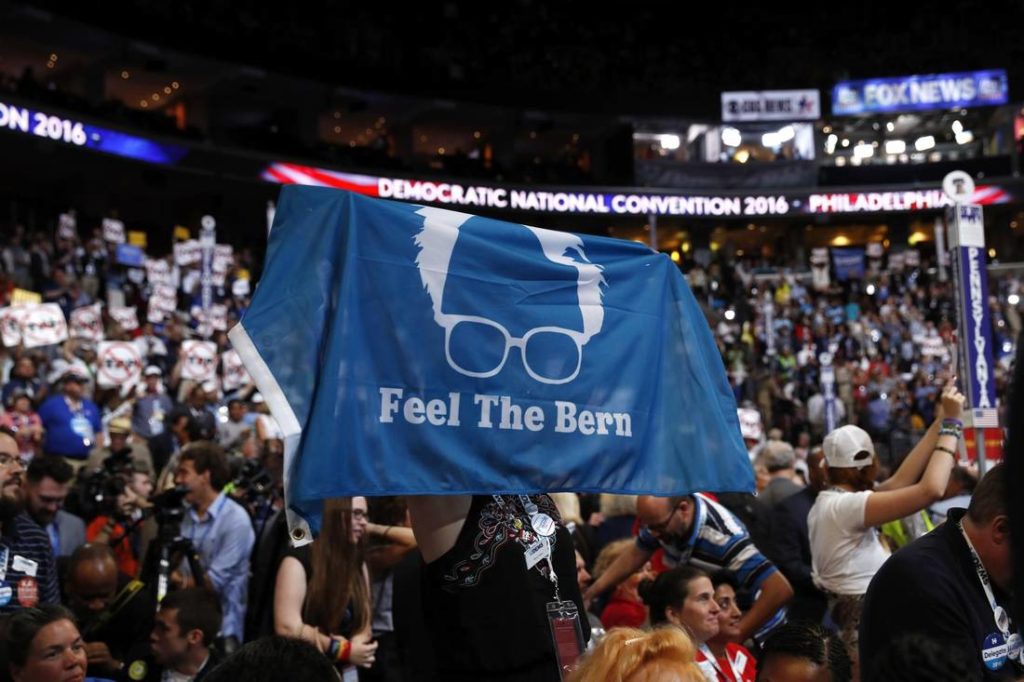
For all of the hoopla attached to a political convention, it all comes down to this: that moment when the presumptive nominee becomes the nominee outright. On Tuesday night, Hillary Clinton is to become the first woman presidential nominee of a major party. The result is foreordained, but the roll call of the states will nonetheless be an emotional coda for Bernie Sanders supporters whose passion and energy took the Vermont senator from fringe candidate to serious contender. Some things to watch for at the Democratic convention on Tuesday: ROLL CALL All of the energy and angst of the hard-fought primary battle between Clinton and Sanders will culminate in the roll call of the states. Each state delegation will get a chance to announce how its delegates are voting. Sanders delegates have pushed to have their votes fully tallied. Sanders has left open the possibility that Clinton could receive the nomination by acclamation — or unanimous nomination — at the end of the roll call. That may not satisfy his delegates. Some are ready to boo or even walk out if there is a unanimous nomination. In 2008, Clinton halted the roll call midway through to call for then-Sen. Barack Obama‘s approval by acclamation, or unanimous vote. FIRST DUDE The spouse of a presidential nominee always gets some love at a party convention. And Bill Clinton‘s speech Tuesday night will pique extra interest since he hopes to be the first first man. Bill Clinton also carries the extra title of ex-president and is a beloved figure to party faithful. But the former president carries with him the baggage of numerous scandals and investigations from his years in the White House. And Clinton, famously protective of his wife, can get in trouble when he gets carried away in defending her. Watch how he’s introduced: Hillary Clinton has joked that she’s still working on what to call her husband if she’s elected, offering “first dude” and “first mate” as possibilities. MOTHERS OF THE MOVEMENT Hoopla and celebration will give way to a somber moment when the convention showcases “mothers of the movement” — women whose children have died in gun violence. The speakers will include the mothers of Eric Garner and Michael Brown, both killed by police. The moment will not be without controversy: Philadelphia’s police union complained that Clinton was showcasing killings by police without giving equal time to the families of fallen officers. Clinton’s campaign responded that two members of law enforcement also are on the convention schedule. MANNERS, MANNERS Will they heed their leader? Sanders’ supporters are bringing a lot of emotion to the convention hall with them, and their leader is having trouble containing it. Sanders has sent out text messages and emails asking his supporters “as a personal courtesy” to him to “not engage in any kind of protest on the floor.” The Vermont senator said in an email that the movement’s credibility “will be damaged by booing, turning of backs, walking out or other similar displays.” Republished with permission of the Associated Press.
Democratic Convention: what to watch for on Day 1
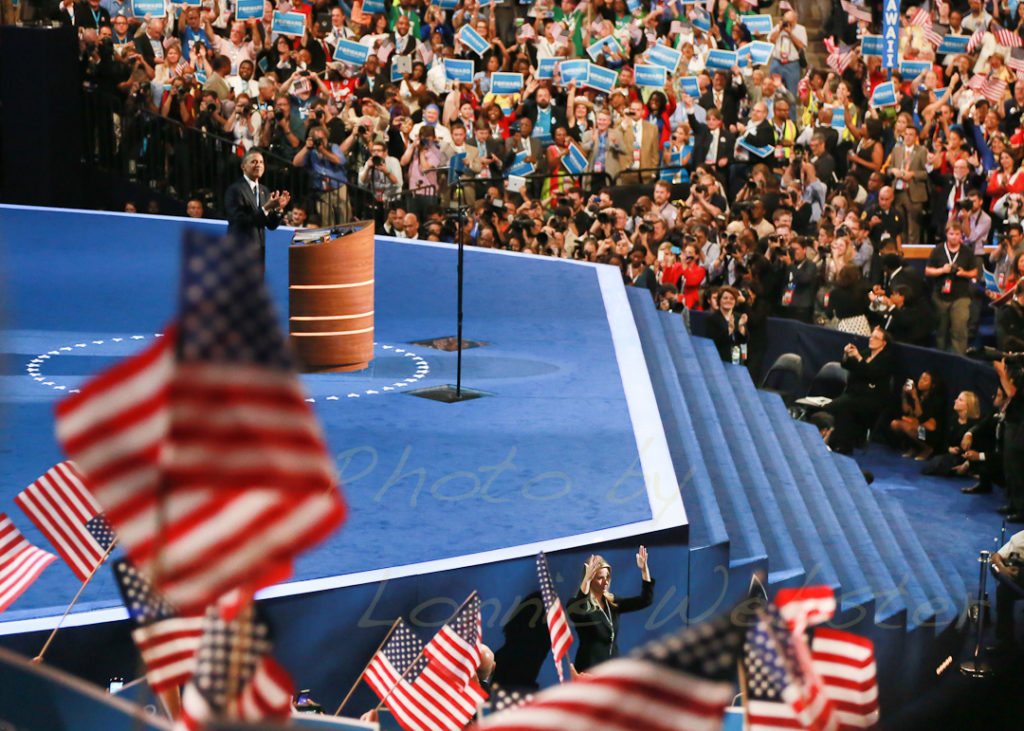
The Democratic National Convention — a four-day event where presidential hopeful Hillary Clinton is poised to officially be selected as the party’s presidential nominee — kicks off in Philadelphia Monday. Following suit of the Republican Convention just last week, Democrats wasted little time Monday showing that their party is just as dysfunctional and divided as their GOP counterparts. In the wake of Friday’s leak of thousands of emails showing DNC officials were attempting to undercut Vermont Sen. Bernie Sanders during his primary campaign against Clinton enraged his delegates and has led to large protests in the City of Brotherly Love. The leak also prompted the resignation of Democratic National Committee Chairwoman Debbie Wasserman Schultz. Monday morning the Florida Congressman was greeted with boos by delegates, and hours later she announced she would not gavel in the convention, recognition her presence on the stage would only further showcase Democrats’ deep divisions. Hoping to reunite the party behind Clinton, the DNC’s Day 1 theme will be “United Together” and will focus on putting the future of American families front and center, where speakers will advocate for building an economy that works for everyone, not just those at the top, and where everyone has a chance to live up to their God-given potential. The full list of Monday’s speakers: Pam Livengood: has been personally affected by the growing substance abuse epidemic Karla & Francisca Ortiz: an American citizen but her parents, including her mother, Francisca, are undocumented and live in fear of deportation Keith Ellison: Democratic U.S. Congressman from Minnesota Lily Eskelsen Garcia: National Education Association President Raul Grijalva: Democratic U.S. Congressman from Arizona Tina Kotek: Oregon House Speaker Mary Kay Henry: SEIU President Joe Kennedy: Democratic U.S. Congressman from Massachusetts Dan Malloy: Governor of Connecticut and Chair of the Democratic Governors Association Sean McGarvey: Building Trades President Jeff Merkley: U.S. Senator from Oregon Linda Sanchez: Democratic U.S. Congresswoman from California Lee Saunders: AFSCME President Randi Weingarten: American Federation of Teachers President Anastasia Somoza: an advocate for Americans with intellectual and developmental disabilities Astrid Silva: a Mexican immigrant who has who has benefited from Mr. Obama’s executive actions deferring deportation Richard L. Trumka: president of the AFL-CIO Elizabeth Warren: Democratic U.S. Senator from Massachusetts Bernie: Sanders: U.S. Senator from Vermont and Hillary Clinton’s chief rival for the Democratic nomination Michelle Obama: First Lady of the United States
Steven Kurlander: In defense of Debbie Wasserman Schultz

With the Democratic coronation of Hillary (and Bill again, too) Clinton slated to begin Monday, it looks like Congresswoman and Democratic National Committee Chairwoman Debbie Wasserman Schultz won’t be waiving her very curly hair, or the gavel as Chairwoman of the convention in Philadelphia. In fact, she resigned her position as Chairwoman before the convention began. David Axelrod, the former senior advisor to President Obama, stated Sunday “I would ask her to step aside. I would ask her to step aside because she’s a distraction in a week that is Hillary Clinton’s week.” CNN indicated that over the weekend the DNC decided not to allow DWS to speak or preside over the convention (the term “quarantined” was used) while Politico reported that DWS herself pulled herself off the convention dais for fear of being booed by Bernie Sanders supporters. The latest trouble for DWS as DNC Chairwoman began after the (obviously calculated) leak of over 20,000 email by WikiLeaks revealed that DWS and staffers at the DNC were working very hard against Bernie Sanders and his campaign. There was one particular email that set off its own shitstorm where it appeared to indicate that the DNC was going to play Sanders as an atheist to weaken his appeal to southern voters. Imagine that. DWS and the DNC working hard to ensure that self-described socialist Bernie would not get the nomination? Jeez, as Gomer Pyle would opine, SURPRISE, SURPRISE, SURPRISE! In reality, the American political system in terms of how we pick our leaders was always and continues to be just plain biased. There’s no fairness about it. Never was. Never will be. The expectation that political operatives like DWS and parties are arbiters of fairness is just plain silly. Her job, from the beginning of the campaign, was to ensure that Hillary (and Bill too) got nominated. Period. Whether you like her or not, both in her role as DNC Chairwoman or as the chief Democratic antagonist in the House (particularly after Congressman Anthony Weiner took one too many selfies), DWS has been the ultimate loyal soldier to the “mainstream” Clinton-Pelosi wing of the Democratic Party-whether it meant getting into contentious fights with Axelrod and the Obama White House or doing everything she could to ensure that Hillary (and Bill again too) sailed through a nomination process that was rigged from the get go. As chairwoman of a splintered and weak Democratic Party, DWS accomplished what Reince Priebus and mainstream Bushy Republicans couldn’t do – keep what would be in normal times a truly unqualified, populist candidate from obtaining the nomination for president. So while DWS was forced to resign by her own benefactors, DWS got the job done for Hillary (and Bill too). She may have in the long run also prevented the Democratic Party from becoming truly irrelevant to the majority of Americans too. No matter what David Axelrod or any other Democrats say, DWS should hold her curls and head high for a job well do
Presidential Primary Brief: 168 days until Election Day
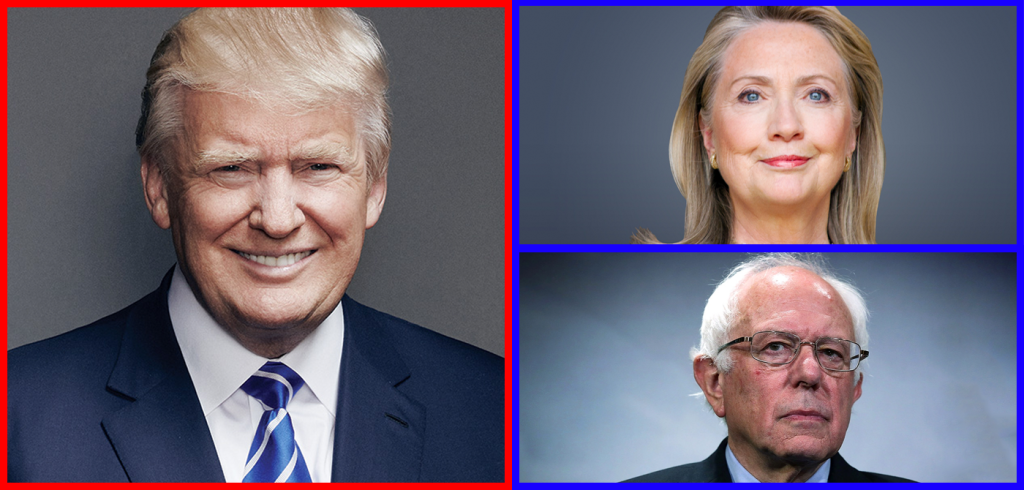
168 days until Election Day Convention Dates: Republican July 18-21 2016, Democratic July 25-28 2016 Weekly Headlines: Trump slips by Clinton in a virtual dead heat in new poll Mark Cuban: I’d consider a future White House bid Sanders backs DNC chair’s primary opponent NRA facing member backlash over Trump endorsement Press Clips: Model That Correctly Predicted Every Election Since 1980 Gives 2016 Verdict (Daily Caller 5/22/16) One of the world’s most well-known financial institutions which correctly predicted every presidential election since 1980 is predicting a win for Hillary Clinton. Moody’s Analytics, a subsidiary of credit ratings agency Moody’s, believes President Obama’s strong approval ratings will give the Democratic nominee a significant advantage come November. Aviation security, presidential election featured on Sunday talk shows (USA Today 5/21/16) Aviation safety and terrorism will share the spotlight with the 2016 presidential election on the five major Sunday talk shows this week. The cause of the crash of an EgyptAir plane into the Mediterranean Sea remains unknown, but it has renewed questions about how to protect airline passengers from tragic accidents and intentional acts of terror. Members of Congress with responsibility for homeland security, foreign affairs and intelligence appear on four shows, as well as Secretary of Homeland Security Jeh Johnson, who will be on Fox News Sunday. Polls Predict a Tightening Presidential Race (National Review 5/17/16) The results from our latest national survey completed on May 16 shows that the de facto end of the Republican presidential nomination and the continuation of Hillary Clinton’s pyrrhic victory over Bernie Sanders are signaling some important cross currents within national voter opinion. Supreme Court Punts on Little Sisters’ Obamacare Case Until After 2016 Election (Breitbart 5/16/16) The Court expresses no view on the merits of the cases.” With that, the Supreme Court in Zubik v. Burwell (the official name for the various “Little Sisters of the Poor” cases) punted the latest Supreme Court fight over Obamacare to 2017 or beyond — but did so in a fashion that conservatives can be happy about for now, teeing up yet another issue that will be decided one way or the other by 2016’s presidential election. Presidential Elections And The Trump Effect On The U.S. Dollar (Forbes 5/18/16) Politics and economics make for intimate bedfellows. The effects of the former on the latter are significant, particularly when the prize is the Oval Office, as in the case of the U.S. Presidential Elections in November this year. While Hillary Clinton and Bernie Sanders are competing for the Democratic Party leadership nomination, Donald Trump is the Republican Party’s presumptive presidential nominee. The Democratic primary race and the Presidential Elections will have an impact on currency market sentiment, as will the result of the election. Here’s How Many Primaries Are Left (Fortune 5/18/16) Admit it — even the most hardcore political junkies, the ones who have watched every debate and stayed up late on every primary night, are ready for primary season to be over. Soon, it will be. For Democrats, the following states still have to vote: Washington (non-binding primary) on May 24. Virgin Islands (12 delegates) on June 4. Puerto Rico (67 delegates) on June 5. California (548 delegates), Montana (27 delegates), New Jersey (142 delegates), New Mexico (43 delegates), North Dakota (23 delegates), and South Dakota (25 delegates) on June 7. And, finally, Washington, DC (46 delegates) on June 14. On the GOP side, here’s what is left: Washington (44 delegates) on May 24. California (172 delegates), Montana (27 delegates), New Jersey (51 delegates), New Mexico (24 delegates), and South Dakota (29 delegates) on June 7. That’s it. When It Comes To Economic Election Prediction Models, It’s A Mixed Bag (NPR 5/17/16) Most election prediction models that try to forecast who’s going to win the presidency take into account some measure of how the economy is doing. That’s because generally if it’s going strong in the six months or so before the election, history suggests the party currently in the White House will win. If the economy stinks, the party not in the White House takes over. But, what if the economy is just so-so like it is now? 538 founder Nate Silver gives Donald Trump 25 percent chance of beating Hillary Clinton (Washington Times 5/15/16) Political prognosticator Nate Silver said Sunday that he gives Republican Donald Trump a 25 percent chance of winning the 2016 presidential election, while noting that he has been wrong before. Mr. Silver admitted that he initially gave Mr. Trump only a 5 percent chance of capturing the Republican nomination, saying he would peak early and “flame out” like 2012 presidential contender Herman Cain. “This is one of the crazier things we’ve seen in politics for a long time. I think it was fair for us to be skeptical early on about the odds this could occur,” Mr. Silver told CNN’s “Reliable Sources.” Stocks, not polls, could predict election winner (USA Today 5/22/16) Ignore the pundits and polls. If you want to know which candidate will win the presidential election, the stock market will let you know. That’s right, it turns out that the Standard & Poor’s 500 index has “correctly predicted” 19 of the past 22 elections, according to data compiled by Daniel Clifton, an analyst at Strategas Research Partners who specializes in how politics impacts financial markets. So who’s got a better shot at the White House in November? Billionaire Donald Trump? Or former first lady and secretary of State Hillary Clinton? US election: Donald Trump open to talks with North Korea (BBC News 5/18/16) Presumptive US Republican presidential candidate Donald Trump says he is willing to meet North Korea’s leader to discuss its nuclear programme. “I would speak to him, I would have no problem speaking to him,” the businessman said of Kim Jong-un. Such a meeting would mark a significant change of US policy towards the politically isolated regime. Conservatives in secretive group ‘slow walk’ Trump support (CNN Politics 5/17/16) Donald Trump has inflicted a dark night of the
Hillary Clinton on track to capture Democratic nomination

Hillary Clinton can lose every remaining primary in the coming weeks and still clinch the nomination. With Clinton’s double-digit win in New York and more than two dozen new superdelegates joining her camp, rival Bernie Sanders now faces a far steeper path. Before New York’s contest, Sanders needed to win 68 percent of remaining delegates and uncommitted superdelegates to catch Clinton. Now to capture the nomination, Sanders must win 73 percent. That means that Clinton can lose all remaining contests and still win. The campaign shifts to primaries Tuesday in Pennsylvania, Maryland, Connecticut, Rhode Island and Delaware. “He will be out of real estate on Tuesday night even if these states are all close, even if he wins a couple, even if we win three,” said Clinton senior strategist Joel Benenson. “He’s got to win them big, he’s got to win them by landslide and I don’t see that happening.” If Clinton does as well as expected in next week’s primaries, she’s on track to clinch the nomination with help from superdelegates, the party insiders who can back either candidate, on June 7. Based on primaries and caucuses alone, the latest AP delegate count, including New York, shows that Clinton leads by 1,428 to 1,151. Including superdelegates, the race stands at 1,930 to 1,189, for Clinton. She needs just 27 percent of the remaining delegates and uncommitted superdelegates to reach the magic number, 2,383. Clinton is moving quickly to cast herself as the all-but-certain nominee. “The race for the Democratic nomination is in the home stretch, and victory is in sight,” she told supporters at her victory party in Manhattan on Tuesday night. Clinton added 33 new endorsements from superdelegates over the past month, according to a new Associated Press survey, expanding her already overwhelming support, despite Sanders’ recent string of victories in Wisconsin and the West. Sanders picked up just seven such endorsements. Democratic allies of the Clinton campaign say there are dozens more who back her. Some say privately that they don’t want to make their support public because they fear aggressive online attacks from certain Sanders backers, who’ve harassed some superdelegates with threatening calls and emails. The Sanders campaign contends that if he can close the gap with Clinton among delegates chosen in primaries and caucuses, the superdelegates will flock to his side to avoid overturning the will of the party’s voters. While superdelegates are free to switch their vote, Sanders would need to flip dozens to catch up to her. Looking at just superdelegates, Clinton has 502, while Sanders has 38. So far, none has switched to Sanders and there’s little indication many would defect. “She’s the person I think who can continue to lead this country in the right direction,” said Democratic National Committee member Valarie McCall, of Cleveland, now for Clinton. “I don’t know how much more qualified one can be.” Both campaigns had cast the New York primary as one that would either put Clinton on a clear path to the nomination or bolster Sanders after a string of primary wins. Sanders aides are now saying they will re-examine the campaign’s position in the race after delegate-rich primaries in five northeastern states Tuesday. “Next week is a big week,” said senior adviser Tad Devine. “We’ll see how we do there and then we’ll be able to sit back and assess where we are.” Still, few in the Democratic Party expect Sanders to exit the race formally before the final contests in June. He continues to attract tens of thousands to rallies – addressing more than 28,000 in Brooklyn two days before the primary. And he continues to raise millions of dollars, giving him fodder for a persistent fight. In New York, Sanders spent $6.5 million on television ads compared with $4.2 million for Clinton according to CMAG’s Kantar Media. The ad onslaught has come with a more negative tone going after her character – the issue Republicans want to put front and center in the fall election – and that has frustrated Clinton and her team. The longer the race goes on, the more her negative ratings have risen. Fifty-six percent of people surveyed had a negative view of her, an all-time high, according to an NBC/Wall Street Journal poll earlier this week. Robby Mook, Clinton’s campaign manager, said Sanders must decide whether he wants to continue to “make casualties” of the likely nominee and the Democratic Party. But the success of Sanders, a decades-long independent, also underscores her weaknesses with critical segments of the Democratic coalition. She’s struggled with younger voters and liberal activists, whose enthusiasm will be necessary to fuel her general election bid. While she stopped short of declaring victory on Tuesday night, Clinton has increasingly sprinkled her remarks with pleas for party unity. “To all the people who supported Senator Sanders, I believe there is much more that unites us than divides us,” she told the cheering crowd. Republished with permission of the Associated Press.
Bernie Sanders campaign: DNC is “attempting to undermine” campaign
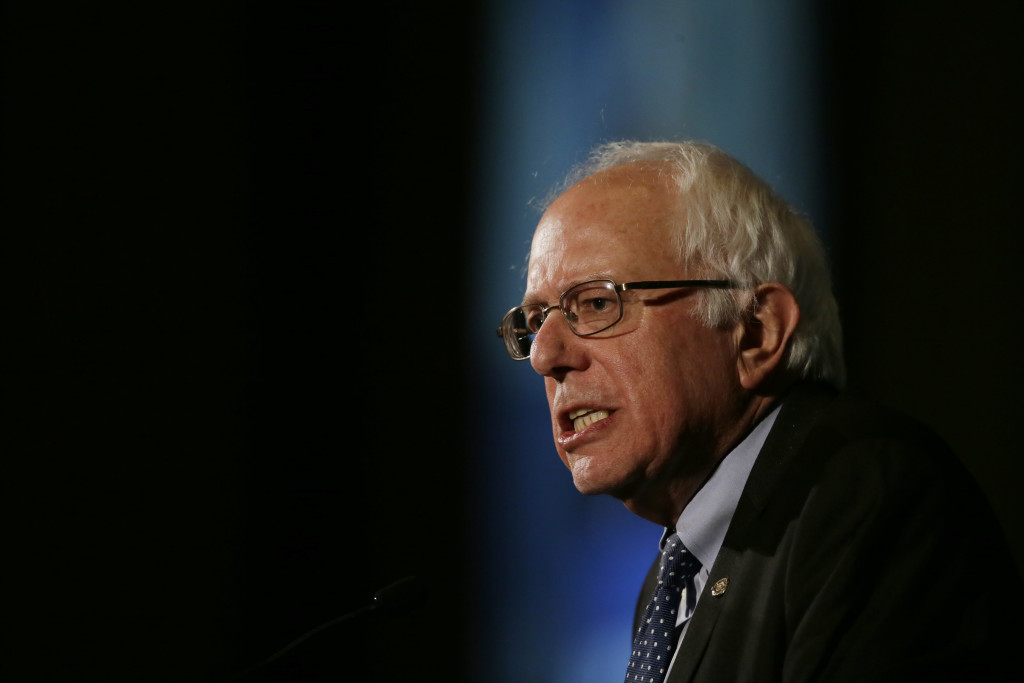
Bernie Sanders‘ presidential campaign angrily accused the Democratic Party of “taking our campaign hostage” on Friday after it was temporarily barred from accessing a trove of information about potential voters as punishment for improperly accessing data compiled by the campaign of rival Hillary Clinton. The reaction of the Democratic National Committee to the data breach, the depth of which was debated by all involved, thrust into the open long-standing suspicions among Sanders and his supporters that the national party is unfairly working to support the candidacy of its front-runner. “Clearly, in this case, they are trying to help the Clinton campaign,” said Sanders campaign manager Jeff Weaver, who threatened to file a lawsuit against the DNC as soon as Friday afternoon, unless the party backs down. DNC Chairwoman Debbie Wasserman Schultz responded that “the Sanders campaign had inappropriately and systematically accessed Clinton campaign data,” rejecting Weaver’s effort to portray the breach as the fault of a software glitch and a small group of rogue staffers. Clinton spokesman Brian Fallon said the campaign was “informed that our proprietary data was breached by Sanders campaign staff in 25 searches by four different accounts and that this data was saved into the Sanders’ campaign account.” “We are asking that the Sanders campaign and the DNC work expeditiously to ensure that our data is not in the Sanders campaign’s account and that the Sanders campaign only have access to their own data,” he added. The back-and-forth on the eve of the party’s final presidential debate of the year underscored Sanders’ attempt to cast himself as an anti-establishment upstart willing to take on Clinton, the unquestioned front-runner for the party’s nomination who is not beloved among some of the party’s most liberal voters. But by firing his top data staffer, and acknowledging that members of his staff looked at information that belonged to the Clinton campaign, Sanders also threatened to undercut his image as an honest broker seeking to foster a “political revolution” to help the nation’s poor and beleaguered middle class. The incident interrupted a period in which Democrats were sailing toward a peaceful primary season, with Clinton comfortably ahead of Sanders nationally in a campaign that harbors little of the discord and discontent roiling the Republican Party. The DNC maintains an extensive database of voter information that it rents to campaigns. The campaigns then update that database with their own information about voters. The data is used to target likely voters and anticipate what issues might motivate them to support a candidate. The information is of particular importance in the first states to votes in the presidential nominating process, where a campaign’s ability to organize its supporters and make sure they cast a ballot can make the difference between winning and losing. Firewalls are put in place to prevent campaigns from looking at data maintained by their rivals. But officials said the vendor that runs the system, NGP VAN, ran a software patch on Wednesday that allowed all users on the system to access data belonging to other campaigns. The breach did not involve any hacking or enable any voting information to enter the public domain, officials said. The Sanders campaign accused NGP VAN of making “serious errors.” Weaver said four members of the Sanders campaign had accessed the information, but only the actions of one, the campaign’s data director, had risen to the level of a firing offense. Weaver argued that the firewall used by the vendor had previously failed and he railed against the party for not taking the steps required to keep the information secure. “While that information was made available to our campaign because of the incompetence of the vendor, it should not have been looked at,” Weaver said. Josh Uretsky, the data director fired from Sanders’ campaign, said his team was merely investigating the security problem and trying to figure out how exposed their own data was by the software patch. “We wanted to document and understand the scope of the problem so we could report it accurately,” he said, in an interview with MSNBC. “We didn’t actually use it for anything valuable and we didn’t take custodianship of it.” While Uretsky took responsibility for the incident, he didn’t believe the DNC would think he violated any rules. “I didn’t believe at the time that I did it that they would believe what I was doing was wrong,” he said in the interview. “I did it with full knowledge that they could see what I was doing.” Wasserman Schultz said the DNC had asked the Sanders campaign for a “full accounting of whether or not this information was used and the way in which it was disposed.” Only then will the party make a decision on restoring Sanders’ access to the database. That decision infuriated Weaver, who said the party had cut Sanders and his team off from “lifeblood of any campaign.” “This is information that we have worked hard to obtain,” he said. “It is our information, not the DNC’s.” News of the data breach was first reported by The Washington Post on Friday. DNC spokesman Luis Miranda said Friday the party had instructed NGP VAN to conduct an analysis of any users who accessed the data and report back its findings. Stu Trevelyan, NGP VAN’s chief executive and president, said in a statement that his firm was “confident at this point that no campaigns have access to or have retained any voter file data of any other clients; with one possible exception, one of the presidential campaigns.” “NGP VAN is providing a thorough report to the DNC on what happened and conducting a review to ensure the integrity of the system,” he said. Republished with permission of the Associated Press.
Party insiders give Hillary Clinton early, commanding delegate edge

Hillary Rodham Clinton has locked up public support from half of the Democratic insiders who cast ballots at the party’s national convention, giving her a commanding advantage over her rivals for the party’s presidential nomination. Clinton’s margin over Vermont Sen. Bernie Sanders and former Maryland Gov. Martin O’Malley is striking. Not only is it big, but it comes more than two months before primary voters head to the polls — an early point in the race for so many of the people known as superdelegates to publicly back a candidate. “She has the experience necessary not only to lead this country, she has experience politically that I think will help her through a tough campaign,” said Unzell Kelley, a county commissioner from Alabama. “I think she’s learned from her previous campaign,” he said. “She’s learned what to do, what to say, what not to say — which just adds to her electability.” The Associated Press contacted all 712 superdelegates in the past two weeks, and heard back from more than 80 percent. They were asked which candidate they plan to support at the convention next summer. The results: Clinton: 359. Sanders: 8. O’Malley: 2. Uncommitted: 210. The 712 superdelegates make up about 30 percent of the 2,382 delegates needed to clinch the Democratic nomination. That means that more than two months before voting starts, Clinton already has 15 percent of the delegates she needs. That sizable lead reflects Clinton’s advantage among the Democratic Party establishment, an edge that has helped the 2016 front-runner build a massive campaign organization, hire top staff and win coveted local endorsements. Superdelegates are convention delegates who can support the candidate of their choice, regardless of who voters choose in the primaries and caucuses. They are members of Congress and other elected officials, party leaders and members of the Democratic National Committee. Clinton is leading most preference polls in the race for the Democratic nomination, most by a wide margin. Sanders has made some inroads in New Hampshire, which holds the first presidential primary, and continues to attract huge crowds with his populist message about income inequality. But Sanders has only recently started saying he’s a Democrat after a decades-long career in politics as an independent. While he’s met with and usually voted with Democrats in the Senate, he calls himself a democratic socialist. “We recognize Secretary Clinton has enormous support based on many years working with and on behalf of many party leaders in the Democratic Party,” said Tad Devine, a senior adviser to the Sanders campaign. “But Sen. Sanders will prove to be the strongest candidate, with his ability to coalesce and bring young people to the polls the way that Barack Obama did.” “The best way to win support from superdelegates is to win support from voters,” added Devine, a longtime expert on the Democrats’ nominating process. The Clinton campaign has been working for months to secure endorsements from superdelegates, part of a strategy to avoid repeating the mistakes that cost her the Democratic nomination eight years ago. In 2008, Clinton hinged her campaign on an early knockout blow on Super Tuesday, while Obama’s staff had devised a strategy to accumulate delegates well into the spring. This time around, Clinton has hired Obama’s top delegate strategist from 2008, a lawyer named Jeff Berman, an expert on the party’s arcane rules for nominating a candidate for president. Clinton’s increased focus on winning delegates has paid off, putting her way ahead of where she was at this time eight years ago. In December 2007, Clinton had public endorsements from 169 superdelegates, according to an AP survey. At the time, Obama had 63 and a handful of other candidates had commitments as well from the smaller fraction of superdelegates willing to commit to a candidate. “Our campaign is working hard to earn the support of every caucus goer, primary voter and grass roots and grasstop leaders,” said Clinton campaign spokesman Jesse Ferguson. “Since day one we have not taken this nomination for granted and that will not change.” Some superdelegates supporting Clinton said they don’t think Sanders is electable, especially because of his embrace of socialism. But few openly criticized Sanders and a handful endorsed him. “I’ve heard him talk about many subjects and I can’t say there is anything I disagree with,” said Chad Nodland, a DNC member from North Dakota who is backing Sanders. However, Nodland added, if Clinton is the party’s nominee, “I will knock on doors for her. There are just more issues I agree with Bernie.” Some superdelegates said they were unwilling to publicly commit to candidates before voters have a say, out of concern that they will be seen as undemocratic. A few said they have concerns about Clinton, who has been dogged about her use of a private email account and server while serving as secretary of state. “If it boils down to anything I’m not sure about the trust factor,” said Danica Oparnica, a DNC member from Arizona. “She has been known to tell some outright lies and I can’t tolerate that.” Still others said they were won over by Clinton’s 11 hours of testimony before a GOP-led committee investigating the attack on a U.S. consulate in Benghazi, Libya. Clinton’s testimony won widespread praise as House Republicans struggled to trip her up. “I don’t think that there’s any candidate right now, Democrat or Republican, that could actually face up to that and come out with people shaking their heads and saying, ‘That is one bright, intelligent person,’” said California Democratic Rep. Tony Cardenas. Republished with permission of The Associated Press.
Possible Joe Biden bid for White House faces rough road
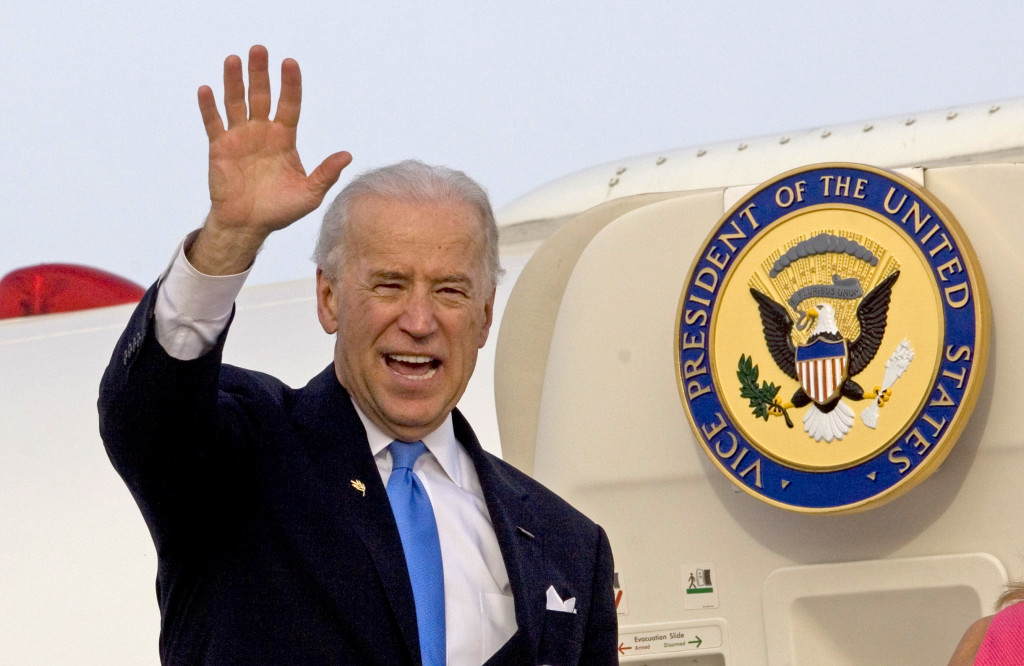
The only trace of the vice president came on a candy wrapper. Joe Biden may be considering whether to enter the race for president, but he sat out last week’s meeting of the Democratic National Committee. In his place, backers greeted a curious few in a hotel suite 20 floors above the official gathering, handing out chocolate bars wrapped with a stylized photo of Biden behind the wheel of a convertible and an “I’m Ridin’ with Biden” label. In any other year, a sitting vice president would have headlined such a meeting as the heavy favorite for the party’s nomination. Instead, the gathering served as proof that if Biden choses to run, he’ll do so as an underdog to Hillary Rodham Clinton. Clinton’s years-long flirtation with a second White House campaign — time her allies used to lock up support of much of the Democratic Party’s leadership — and her undeniable political celebrity have upended the traditional script. Rather than inheriting his party’s machine, a Biden campaign would have to find a way to take it back. “Secretary Clinton’s folks have been talking to these people for a very, very long time,” said Vermont Sen. Bernie Sanders, whose vibrant crowds and steady poll numbers make him Clinton’s strongest current challenger. “So she has a huge advantage.” Yet Biden’s supporters see an opening, due in no small part to Clinton’s inability to shake questions about her use of a personal email server while serving as secretary of state. His candor, long history of fighting for Democratic causes and personal struggles — a widower at a young age now grieving over the recent death of his son Beau — make him an admired figure in the party. “He’s one of us. He gets it,” said Jon Cooper, a supporter who this summer began working with a group encouraging Biden to enter the race. “Everybody likes Joe Biden.” That group, a super PAC named Draft Biden, is a blend of Chicago-based fans of the vice president and political operatives with ties to his family. It sent five employees to the DNC meeting, emailing attendees and passing out fliers in hallways to invite people to their pro-Biden hotel suite. A total of about 75 came to four open-house sessions, said Josh Alcorn, a former aide to Beau Biden who joined the group with the family’s blessing. “People seemed excited about the possibility and were willing to take a look,” he said. Some Democrats who heard the pitch asked to stay in touch. Others remained skeptical. “I asked them, ‘What’s his path?’” said Mitchell Ceasar, a Florida attorney and party operative. Their answer — that he could cobble together votes from all sorts of Democratic coalitions — prompted a shrug. “The challenge to the vice president is to present a compelling argument why someone should get on a different train, a different train that’s going in the same direction,” he said. The practicalities of running also remain difficult for the vice president. His supporters say he must decide before the first Democratic debate, in mid-October. While Biden has no campaign operation beyond the small Draft Biden group, Clinton has for months built a sprawling machine of hundreds of employees working out of her Brooklyn campaign headquarters and in dozens of offices across the country. Her version of Draft Biden, a since-shuttered outside group called Ready for Hillary, spent years before Clinton got into the race amassing millions of email addresses of potential supporters. Money is another challenge. Biden represented the small state of Delaware in the Senate and has never raised significant sums for his own campaigns. Draft Biden, just a few months old, raised less than $100,000 through the end of June. While supporters say bigger checks have been rolling in recently, Clinton is a former first lady and senator from New York with a strong fundraising history. In the first three months of her campaign, she raised $45 million for the primary contest alone. Clinton’s team has also devoted significant resources already to wooing super delegates — the party and elected officials empowered to select the presidential nominee at the Democratic national convention regardless of the 2016 primaries. Clinton backers, who sported gold “H” lapel pins at the DNC meetings, were rewarded for their loyalty with invitations to private briefings from Clinton and top campaign officials. Several hundred Democratic delegates who signed cards pledging to support her mingled atop a skyscraper in downtown Minneapolis Thursday night. Clinton talked for about 15 minutes, drawing cheers when she assured them, “I’m not a quitter.” Ed Cote, a Washington state Democratic leader and a Clinton admirer, said that event was a perfect example of why Biden would find himself in a tougher primary than a sitting vice president might expect. “Most of the people there have votes on the first ballots, and they’re solidly with her,” Cote said. “She’s doing exactly what she needs to be doing.” Clinton learned the importance of that support in 2008, when she ended her long, hard-fought primary campaign after it became clear she lacked enough delegates to capture the nomination. “We are working really hard to lock in as many supporters as possible,” Clinton said Friday. “This is really about how you put the numbers together to secure the nomination.” Republished with permission of The Associated Press.
Hillary Clinton lawyer says her email server was wiped clean
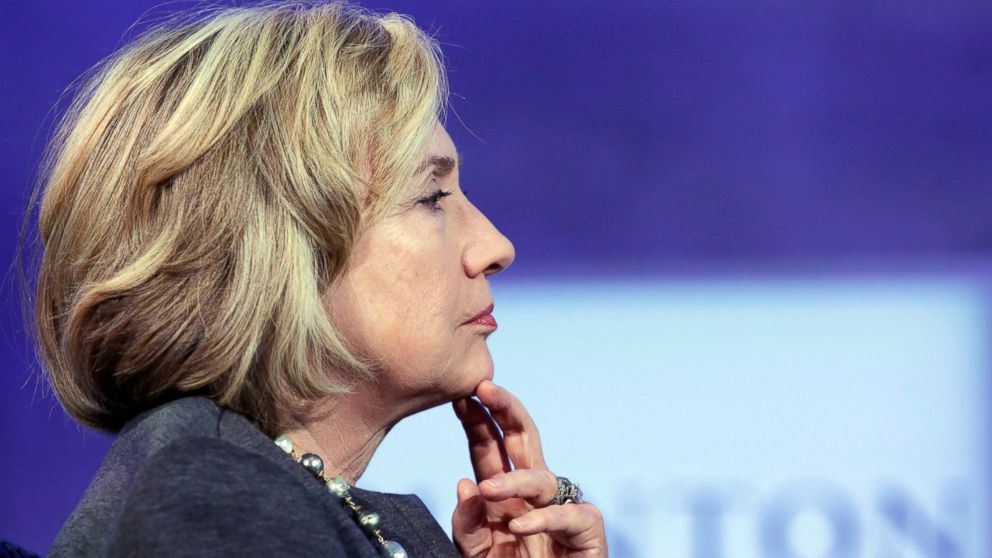
Hillary Rodham Clinton‘s personal lawyer has told a Senate committee that emails and all other data stored on her computer server were erased before the device was turned over to federal authorities. In a letter sent last week to Sen. Ron Johnson, R-Wis., the chairman of the Senate Homeland Security Committee, attorney David Kendall said the server was transferred to the FBI on Aug. 12 by Platte River Networks, a Denver firm hired by Clinton to oversee the device. The Senate committee made Kendall’s letter public on Wednesday. In exchanges with reporters earlier this week, Clinton said she was not aware if the data on her server was erased. Confirmation that the server was wiped clean came amid mounting confusion over how sensitive some of the Clinton emails were and how much of their contents should have been released. Clinton aides said at least two emails that might have triggered the federal inquiry were not marked secret at the time. But a Republican senator said Wednesday that U.S. inspector generals for the State Department and the intelligence community were told by some of the agency’s freedom of information specialists that department lawyers released some Clinton materials to the public over their objections. Federal investigators, prompted by a request from the inspector general for the State Department, requested custody of the server to learn whether the data stored on it was secure. NBC News has reported that an FBI team is now examining the server. Forensics experts told The Associated Press this week that some emails and other data may still be extracted from servers even after they are supposedly expunged. Separately, John Podesta, Clinton’s campaign chairman, told reporters Wednesday in Columbia, South Carolina, that, to his knowledge, no other copy had been made of the server’s contents other than those her lawyers turned over to the FBI. As campaign officials answered questions, one of Clinton’s rivals said the email issue has become a distraction for the Democratic Party. “I think that it’s a huge distraction from what we should be talking about as a party,” former Maryland Gov. Martin O’Malley told reporters in Nevada. Instead, he said more debates should be held among the candidates to address raising the minimum wage, repairing the country’s infrastructure and other issues. “Until we do, our party’s label is going to be the latest news du jour about emails and email servers and what Secretary Clinton knew and when she knew it.” O’Malley said some people in the Democratic National Committee are “circling the wagons.” Kendall, Clinton’s long-time personal lawyer, said in his letter to the committee that both he and another lawyer at his firm were given security clearances by the State Department to handle a thumb drive that contained about 3,000 emails later turned over to the agency. Kendall said the thumb drive was stored in a safe provided in July by the State Department. Kendall did not say when he was given his clearance from State. The GOP-dominated Senate Judiciary Committee has asked Kendall if he had any access to Clinton’s emails before he was given his security clearance. Republican senators on both committees are pressing to see whether any emails sent or received by Clinton on the private server while she was secretary of state contained any secret information that should have been only exchanged on secured, encrypted government communications portals. An inspector general for the State Department said recently that several emails sent to Clinton did include such classified material – signaling that the transmission of those emails may have risked violating government guidelines for the handling of classified material. Clinton campaign officials on Wednesday sought to show that the information contained in the emails that she received did not risk spillage of classified data at the time they were sent to her. During a conference call, campaign aides pointed to a Fox News report that at least two of the emails that prompted the inspector general’s referral may have contained sensitive information but were not marked “classified” at the time they were sent to Clinton by aides. Campaign spokesman Brian Fallon noted that the two emails were sent to Clinton from career diplomats, not political appointees, and that they “did not have information marked `classified’ or any classified documents attached to them.” Information in one of the documents, a 2012 email to Clinton about arrests in Libya, was later classified as secret by the FBI, but then released with redactions this year by the State Department, highlighting a dispute between the two agencies over whether the material should have been made public. A second email from 2011 was also released in full but reportedly contained classified military information. “All this goes to show that when it comes to classified information, not all standards are black and white,” Fallon said. There are disputes even within the State Department, said Senate Judiciary Chairman Sen. Charles Grassley, R-Iowa. In a letter sent Wednesday to Secretary of State John Kerry, Grassley said several State FOIA examiners told inspectors general that several lawyers from the State Department Office of the Legal Advisor fully cleared some Clinton emails for public release despite recommendations that several passages needed to be censored for national security reasons. “This dispute may have already contributed to at least one classified email being inappropriately released to the public,” Grassley said. He also questioned whether some State Department lawyers may have had potential conflicts of interest. State Department spokesman Alec Gerlach said: “The law is what governs redactions and upgrades. We are making appropriate redactions – following the standards laid out under FOIA for redactions as well as the rules governing classification as defined” by presidential orders. Republished with permission of The Associated Press.


